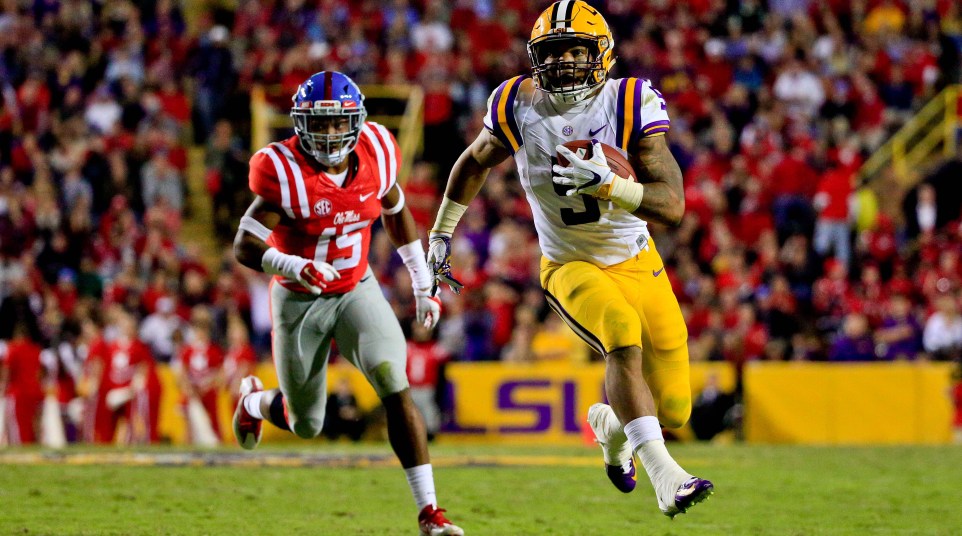
LSU superlatives: MVPs, top rookie, best assistant in 2016
When you pick the superlatives for LSU’s 2016 football season, the first thing you notice is who was missing.
There’s no longer a Les Miles or Cam Cameron on the staff. Leonard Fournette was injured so much, he’s not a candidate to be the top offensive player. The starting quarterback, Brandon Harris, didn’t play a meaningful snap after early September.
And it’s notable that a couple of people who earned the distinctions mentioned below are there partly because of the people they had to replace.
Offensive Player of the Year
RB Derrius Guice, So.: The emergence of Derrius Guice was the (on-field) story of the year for LSU in the context of what Fournette was supposed to do.
Instead, it was Guice, with his 113.5 yards per game rushing putting him second in the SEC behind Auburn’s Kamryn Pettway. The remarkable thing is, Guice did it despite being the backup in six of 11 games, including games against Wisconsin and Alabama where he barely registered on the stat sheet.
How? His eight yards per carry is tops among SEC running backs.
The bottom line is, LSU was better with a healthy Guice starting instead of a beat-up Fournette. The Tigers were 4-1 in games Guice started and 3-3 with Fournette. And one could argue that, in the 16-10 loss to Florida where Guice got the start, the Tigers may have been better off without a gimpy Fournette taking carries from Guice.
It brings us to one of LSU’s burning questions: Is Guice better than Fournette? That’s impossible to judge this season because we never saw a healthy Fournette. But one thing is for certain, even with Fournette hurting this year, LSU never lost an ounce of confidence in the running game.

Credit: Jeff Hanisch-USA TODAY Sports
Defensive Player of the Year
OLB Arden Key (above), So.: The passing game is often a question of timing. The quarterback has to deliver the ball in a certain rhythm to receivers who have to be in certain spots at a certain time.
Key is one of those pass-rushers who disrupts that rhythm, an edge rusher so relentless, offenses have to speed up and lose their timing, making every other job on the field easier for Key’s teammates.
At 6-foot-6 and 238 pounds, he looks more like a bulked up small forward than a linebacker, but he is explosive and his length gives him tremendous leverage against blockers. And his closing speed is, well, like a small forward finishing a fast break.
He finished with 10 sacks, 12.5 tackles for loss and 10 quarterback hurries despite playing in just 10 games. But that only begins to reflect the number of plays where offenses looked uncomfortable trying to steer clear of his imminent arrival in the backfield.
There were other good options here, such as tackles leader Kendell Beckwith at linebacker, safety Jamal Adams and cornerback Tre’Davious White, all legitimate all-SEC talents. But Key’s ability to make offenses panic makes his contributions unique.
Rookie of the Year
QB Danny Etling, Jr.: This was not a great year to be a true freshman on what was a veteran team at LSU. And while true freshmen made contributions, especially at linebacker (Devin White and Michael Divinity) and punter (the fast-improving Josh Growden), this was mostly a year for the experienced.
So the award should go to Purdue transfer Danny Etling, who took over in LSU’s second game and never let go of the starting job. Of course, there is the question of whether one defines Etling, who was a starter at Purdue and then was in the LSU program last season sitting out as a transfer, as a rookie.
If you do include him as a rookie, there’s no questioning his impact.
With Etling at quarterback instead of Brandon Harris, the Tigers did not transform into a passing powerhouse, but they did get harder to predict – Etling throws to more receivers – and his pass efficiency (135.8) was an improvement on Harris’ 130 rating as the starter in 2015. He completed 144 of 240 passes for for 1,906 yards, 9 touchdowns and 4 interceptions.
Assistant coach of the year
Interim offensive coordinator Steve Ensminger: Dave Aranda just became the highest paid defensive coordinator in college football (reportedly $1.8-1.9 million a year) for a reason. LSU’s defense, which allowed 323 yards and 16.4 points per game, was outstanding.
But how about a little love for Ensminger, who was years removed from his last offensive coordinator gig when Ed Orgeron moved him from being tight ends coach to offensive coordinator to replace the also-fired Cam Cameron.
What did he do? In short notice, he led a revamped offense that was struggling under Cameron to average 32.4 points in his seven games. Projected over the entire season, that would have ranked fifth in the SEC — not bad for what had been a stagnant offense before he took over.
Alas, he could not figure out the Alabama puzzle (but who can?) as his charges were held to a mere 125 yards in a 10-0 loss.
Outside of that, however, the LSU offense became an efficient machine, even with injuries on the offensive line and a gimpy Fournette. Ensminger, who will return to tight ends coach next year, deserves a ton of credit for what he was able to do on short notice.
